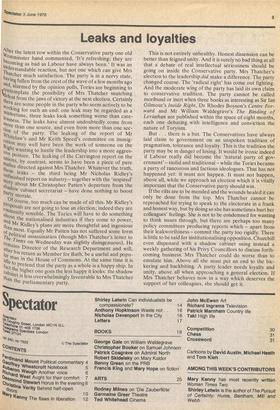Leaks and loyalties
After the latest row within the Conservative party one old 17estrninster hand commented, 'It's refreshing: they are ecoming as bad as Labour have always been.' It was an a,rnderstandable reaction, but not one which can give Mrs ',hatcher much satisfaction. The party is in a nervy state, hater fallen from the crest of the wave of a few months ago and, alarmed by the opinion polls, Tories are beginning to tolltemplate the possibility of Mrs Thatcher snatching 7,efeat from the jaws of victory at the next election. Certainly 'ere are some people in the party who seem actively to be working for such an end: one leak may be regarded as a !aisfortune, three leaks look something worse than carelessness. The leaks have almost undoubtedly come from nit. e're than one source, and even from more than one sec\lx,11 of the party. The leaking of the report of Mr r aitelaw's and Mr Keith Speed's committee on immigation may well have been the work of someone on the ght wanting to hustle the leadership into a more aggres;:v! Posture. The leaking of the Carrington report on the 1,°,ds, by contrast, seems to have been a piece of pure igIles haoce directed against Mrs Thatcher. Whatever the truth, leaks the third being Mr Nicholas Ridley's sullfinished report on industry together with the 'inspired' stl°tY about Mr Christopher Patten's departure from the adow cabinet secretariat have done nothing to boost PartY morale. „ °f course, too much can be made of all this. Mr Ridley's .14°Posals are not going to lose an election; indeed they are Jlatriently sensible. The Tories will have to do something catoout the nationalised industries if they come to power, thnd Mr Ridley's plans are more thoughtful and ingenious ofan most. Equally Mr Patten has not suffered some form 7,4Polit1cal assassination (though Mrs Thatcher's letter to e Titnts on Wednesday was slightly disingenuous). He ,',11aains Director of the Research Department and will, ra`ter his return as Member for Bath, be a useful and popuidri man in the House of Commons. At the same time it is fact c to Pretend that the party as a whole is a happy ship. In c„,_,the higher one goes the less happy it looks: the shadow skuolnet is less overwhelmingly favourable to Mrs Thatcher "'an the parliamentary party. This is not entirely unhealthy. Honest dissension can be better than feigned unity. And it is surely no bad thing at all that a debate of real intellectual seriousness should be going on inside the Conservative party. Mrs Thatcher's election to the leadership did make a difference. The party changed course. The 'radical right' has come out fighting. And the moderate wing of the party has laid its own claim to conservative tradition. The party cannot be called moribund or inert when three books as interesting as Sir Ian Gilmour's Inside Right, Dr Rhodes Boyson's Centre Forward and Mr William Waldegrave's The Binding of Leviathan are published within the space of eight months, each one debating with intelligence and conviction the nature of Toryism.
But . . . there is a but. The Conservatives have always laid claim to government on an unspoken tradition of pragmatism, tolerance and loyalty. This is the tradition the party may be in danger of losing. It would be ironic indeed if Labour really did become the 'natural party of government' -stolid and traditional -while the Tories became a party of rancorous and factious ideologues. That has not happened yet: it must not happen. It must not happen, above all, while we approach an election which it is vitally important that the Conservative party should win.
If the rifts are to be mended and the wounds healed it can only be done from the top. Mrs Thatcher cannot be reproached for trying to speak to the electorate in a frank and honest way, but by doing so she has sometimes hurt her colleagues' feelings. She is not to be condemned for wanting to think issues through, but there are perhaps too many policy committees producing reports which apart from their leakworthiness commit the party too rigidly. There is little to be said for institutionalising opposition. Churchill even dispensed with a shadow cabinet using instead a weekly gathering of his Privy Councillors to discuss forthcoming business. Mrs Thatcher could do worse than to emulate him. Above all she must put an end to the bickering and backbiting. A party leader needs loyalty and unity, above all when approaching a general election. If Mrs Thatcher behaves now in a way which deserves the support of her colleagues, she should get it.


































 Previous page
Previous page